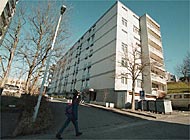Mossad trial due to begin in Lausanne

The trial of an Israeli secret agent opens today at the federal court in Lausanne. The agent is charged with carrying out illegal activities against a foreign state, and of using false passports.
The case of the Mossad agent, who will be tried under an assumed name, has been a particularly sensitive issue between Switzerland and Israel. It dates back to February 1998, when five Israeli citizens, three men and two women, were arrested in the middle of the night at an apartment block in the suburbs of Berne.
The five, who were initially suspected of breaking and entering, did their best to disguise their intentions from the cantonal police; one man faked a heart attack while the other four pretended they had been interrupted in the middle of passionate love making. The ploy worked at first, and the police released four of the Israelis within hours.
But it soon became clear that the Israeli citizens had other business in Berne. The man who remained in detention had a briefcase full of sophisticated electronic listening equipment, and he carried several different passports.
The Swiss federal police also informed their cantonal colleagues that one of the inhabitants of the apartment block at which the five were arrested was a Swiss-Lebanese citizen thought to have links with the Hezbollah guerrilla group. It seemed the Israelis, now assumed to be Mossad agents, had broken into his house in order to bug his telephone.
What had looked at first like a bungled burglary turned into a full-scale diplomatic incident between Switzerland and Israel. The Swiss authorities demanded an apology from the Israelis, and this was grudgingly forthcoming.
But behind the scenes the Swiss were keen not to appear too angry: the case took place at the height of the controversy over Switzerland’s handling of dormant bank accounts belonging to Holocaust victims. The Swiss government and Swiss banks were involved in tortuous negotiations with the World Jewish Congress over a financial settlement, and the last thing Berne wanted was a public row with Tel Aviv.
After 65 days of detention and interrogation, Swiss police released the Mossad agent on bail. Israel paid SFr3 million for his release and promised he would return to Switzerland for his trial.
Now that trial is due to start, many questions remain unanswered. For one, the true name of the accused has not been released, even to the judges, so he will take the stand under the false name of Isaac Bental.
And although it seems clear that Israel will honour its promise to return ‘Bental’ to Switzerland for the trial, this poses a problem for Swiss border officials. Should they welcome him into the country when everyone knows he is travelling under an assumed name with false identity papers?
And if, as some suspect may happen, the Mossad agent claims diplomatic immunity on his arrival in Switzerland, the whole trial will collapse, since foreign nationals with diplomatic immunity cannot be tried before a Swiss court.
Meanwhile the case continues to raise questions about how efficiently Switzerland’s various police forces work together. It is still not entirely clear who was responsible for releasing the other four Mossad agents so soon.
Some rumours allege that senior figures in the Swiss federal police ordered their cantonal colleagues to let them go, in order to prevent a row with Israel. But others claim the cantonal police did not receive adequate information early enough from the federal branch about the true identity of the four, and therefore had no option but to release them.
If, and it is a big if, the trial does proceed as normal, some of these questions will be answered. But the true name and background of the accused is unlikely to be revealed. And since the Swiss-Lebanese man who was to be the target of the spying operation has now dropped his prosecution, Isaac Bental will be tried only for carrying out illegal activities in a foreign state, and possession of false identity papers.
What exactly he was doing in that apartment block in the Berne suburbs, and why, may never be known, so observers hoping to gain more knowledge of the inside workings of the Israeli secret service are almost certain to be disappointed.
by Imogen Foulkes

In compliance with the JTI standards
More: SWI swissinfo.ch certified by the Journalism Trust Initiative








You can find an overview of ongoing debates with our journalists here . Please join us!
If you want to start a conversation about a topic raised in this article or want to report factual errors, email us at english@swissinfo.ch.